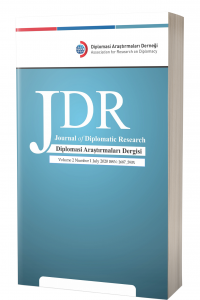BM Barışı Koruma Operasyonları’nın Yerel Polis Kapasitesinin Geliştirilmesine Etkisinin Analizi: Haiti Örneği
Birleşmiş Milletler (BM) 2. Dünya Savaşı’nın ardından ortaya çıkan küresel boyuttaki yıkım sonrası öncelikli olarak çatışmaların önlenmesi, sürdürülebilir barışın sağlanması ve korunması çabalarına hız vermiştir. Uluslararası barış ve güvenliğin sağlanmasında temel sorumluluk sahibi olan Birleşmiş Milletler Güvenlik Konseyi (BMGK), son dönemde barış ve güvenliğin bozulduğu veya tehdit edildiği hallerde ağırlıklı olarak barışı koruma kuvvetlerinin kullanılmasına karar vermiştir. Bu kapsamda BM, Haiti’de yıllar boyunca devam eden siyasal belirsizlik ve sınıf çatışmasına son vererek bozulan istikrarı yeniden sağlamak amacıyla ilk olarak 1993’de müdahalede bulunmuş, birbirinin devamı ve tamamlayıcısı niteliğinde bir dizi Barışı Koruma Operasyonları (BKO) ile nihai barışı tesis etmeye çalışmıştır. Haiti’de görevlendirilen en uzun süreli operasyon olan BM Haiti İstikrar Misyonu (United Nations Stabilization Mission in Haiti/MINUSTAH) ise 2004’de kurulmuştur. Bu yeni Misyon, sadece ateşkes anlaşmalarının uygulanmasının denetimini üstlenen geleneksel BKO’ndan farklı olarak, Haiti Ulusal Polisi’nin (Haitian National Police/HNP) yeniden yapılandırılması ve kapasitesinin artırılması görevini de üstlenmiştir. Bu çalışmada, Haiti’de işlenen suç oranlarının ve polis sayısının yıllar içindeki gelişimi karşılaştırılmalı olarak ele alınarak MINUSTAH’ın, Haiti Ulusal Polisi’nin kapasitesinin geliştirilmesindeki rolü ve etkisi analiz edilmiştir.
Anahtar Kelimeler:
Birleşmiş Milletler, Barışı Koruma Operasyonları, MINUSTAH, Haiti Ulusal Polisi
___
- A.Walter, Dorn, (2009) Intelligence-led Peacekeeping: The United Nations Stabilization Mission in Haiti (MINUSTAH), 2006–07, Intelligence and National Security Vol. 24, No. 6, 805–835.
- Alexandre, Marc (2012). Societal dynamics and fragility: Engaging societies in responding to fragile situations, The World Bank.
- Documents, Sgreports, (2004), http://www.un.org/en/sc/documents/sgreports/2004.shtml, (e.t. 07.12.2018).
- Documents, Troop and Police Contributors, (2004) https://peacekeeping.un.org/sites/default/files/december2004_5.pdf, (e.t. 27.10.2019).
- Documents, Troop and Police Contributors, (2017) https://peacekeeping.un.org/sites/default/files/msr_30_sep_2017- 5_0.pdf (e.t. 27.10.2019).
- MINUJUSTH, Bi-Annual Report, July 2017-December 2017 (2017)
- MINUSTAH Police, Bi-Annual Report, January 2013-June 2013, (2013)
- MINUSTAH Police, Bi-Annual Report, January 2014-June 2014 (2014)
- MINUSTAH Police, Bi-Annual Report, January 2015-June 2015 (2015)
- MINUSTAH Police, Bi-Annual Report, January 2016-June 2016 (2016)
- MINUSTAH Police, Bi-Annual Report, January 2017-June 2017 (2017)
- MINUSTAH Police, Bi-Annual Report, July 2013-December 2013 (2013)
- MINUSTAH Police, Bi-Annual Report, July 2014-December 2014 (2014)
- MINUSTAH Police, Bi-Annual Report, July 2015-December 2015 (2015)
- MINUSTAH Police, Bi-Annual Report, July 2016-December 2016 (2016)
- Mobekk, Eirin (2000). “The Missing Ingredient: Justice in the International Intervention in Haiti”. International Relations, 30-40.
- Öncü, Mehmet (2006). “Birleşmiş Milletler Barışı Koruma Operasyonlarının Hukukî Temelleri”. Uluslararası Hukuk ve Politika, 2 (6), 31-57.
- Pace, Marie; Luzincort, Ketty, “A Brief Background to Conflict in Haiti”, (2018) https://www.cdacollaborative.org/publication/a-brief-background-to-conflict-in-haiti/, (e.t. 07.12.2018).
- Secretary-General's Reports, (2004), https://undocs.org/S/RES/1542(2004), (e.t. 07.12.2018).
- The World Bank, “World Development Indicators”, https://databank.worldbank.org/reports.aspx?source=2&country=HTI&series=&period= (e.t. 13.09.2019).
- UN, “Past Peacekeeping Operations”, https://peacekeeping.un.org/en/past-peacekeeping-operations (e.t. 11.03.2018)
- UN, BMGK, 1542 Sayılı Karar, (2004), https://undocs.org/S/RES/1542(2004), (e.t. 07.12.2018).
- UN, BMGK, 1994 tarih ve 940 Sayılı Kararı, (1994), http://unscr.com/en/resolutions/940, (e.t. 15.12.2018).
- UN, BMGK, 2004 tarih ve 1542 Sayılı Kararı, (2004), http://unscr.com/en/resolutions/1542, (e.t. 07.10.2018).
- UN, BMGK, 2019 tarih ve 2476 Sayılı Kararı, (2019), https://undocs.org/en/S/RES/2476 (e.t. 27.10.2019).
- UN, BMGK, Genel Sekreterin MINUS TAH Raporu, (1995), https://undocs.org/S/1995/46, (e.t. 13.12.2018).
- UN, BMGK, Genel Sekreterin MINUSTAH Raporu, (1995), https://undocs.org/S/1995/305, (e.t. 13.12.2018)
- UN, BMGK, Genel Sekreterin MINUSTAH Raporu, (1995), https://undocs.org/S/1995/614, (e.t. 13.12.2018).
- UN, BMGK, Genel Sekreterin MINUSTAH Raporu, (1995), https://undocs.org/S/1995/922, (e.t. 13.12.2018).
- UN, BMGK, Genel Sekreterin MINUSTAH Raporu, (1996), https://undocs.org/S/1996/416, (e.t. 13.12.2018).
- UN, BMGK, Genel Sekreterin MINUSTAH Raporu, (1996), https://undocs.org/S/1996/813, (e.t. 13.12.2018).
- UN, BMGK, Genel Sekreterin MINUSTAH Raporu, (1997), https://undocs.org/S/1997/244, (e.t. 13.12.2018).
- UN, BMGK, Genel Sekreterin MINUSTAH Raporu, (1997), https://undocs.org/S/1997/832, (e.t. 13.12.2018).
- UN, BMGK, Genel Sekreterin MINUSTAH Raporu, (1998), https://undocs.org/S/1998/144, (e.t. 13.12.2018).
- UN, BMGK, Genel Sekreterin MINUSTAH Raporu, (1998), https://undocs.org/S/1998/796, (e.t. 13.12.2018).
- UN, BMGK, Genel Sekreterin MINUSTAH Raporu, (1999), https://undocs.org/S/1999/181, (e.t. 13.12.2018).
- UN, BMGK, Genel Sekreterin MINUSTAH Raporu, (2000), https://undocs.org/S/2000/150, (e.t. 13.10.2018).
- UN, BMGK, Genel Sekreterin MINUSTAH Raporu, (2000), https://undocs.org/S/2000/150, (e.t. 13.10.2018).
- UN, BMGK, Genel Sekreterin MINUSTAH Raporu, (2004), https://undocs.org/S/2004/300, (e.t. 13.10.2018).
- UN, BMGK, Genel Sekreterin MINUSTAH Raporu, (2004), https://undocs.org/S/2004/698, (e.t. 13.12.2018).
- UN, BMGK, Genel Sekreterin MINUSTAH Raporu, (2004), https://undocs.org/S/2004/908, (e.t. 14.12.2008).
- UN, BMGK, Genel Sekreterin MINUSTAH Raporu, (2005), https://undocs.org/S/2005/124, (e.t. 14.12.2018).
- UN, BMGK, Genel Sekreterin MINUSTAH Raporu, (2005), https://undocs.org/S/2005/313, (e.t. 14.12.2018).
- UN, BMGK, Genel Sekreterin MINUSTAH Raporu, (2006), https://undocs.org/S/2006/592, (e.t. 14.12.2018).
- UN, BMGK, Genel Sekreterin MINUSTAH Raporu, (2006), https://undocs.org/S/2006/1003, (e.t. 14.12.2018).
- UN, BMGK, Genel Sekreterin MINUSTAH Raporu, (2006), https://undocs.org/S/2006/60, (e.t. 14.12.2018).
- UN, BMGK, Genel Sekreterin MINUSTAH Raporu, (2007), https://undocs.org/S/2007/503, (e.t. 14.12.2018).
- UN, BMGK, Genel Sekreterin MINUSTAH Raporu, (2008), https://undocs.org/S/2008/202, (e.t. 14.12.2008).
- UN, BMGK, Genel Sekreterin MINUSTAH Raporu, (2009), https://undocs.org/S/2009/439, (e.t. 14.12.2018).
- UN, BMGK, Genel Sekreterin MINUSTAH Raporu, (2009), https://undocs.org/S/2009/129, (e.t. 14.12.2018).
- UN, BMGK, Genel Sekreterin MINUSTAH Raporu, (2010), https://undocs.org/S/2010/200, (e.t. 14.12.2018).
- UN, BMGK, Genel Sekreterin MINUSTAH Raporu, (2010), https://undocs.org/S/2010/446, (e.t. 14.12.2018).
- UN, BMGK, Genel Sekreterin MINUSTAH Raporu, (2011), https://undocs.org/S/2011/540, (e.t. 14.12.2018).
- UN, BMGK, Genel Sekreterin MINUSTAH Raporu, (2012), https://undocs.org/S/2012/128, (e.t. 14.12.2018).
- UN, BMGK, Genel Sekreterin MINUSTAH Raporu, (2012), https://undocs.org/S/2012/678, (e.t. 14.12.2018).
- UN, BMGK, Genel Sekreterin MINUSTAH Raporu, (2013), https://undocs.org/S/2013/139, (e.t. 14.12.2018).
- UN, BMGK, Genel Sekreterin MINUSTAH Raporu, (2013), https://undocs.org/S/2013/493, (e.t. 14.12.2018).
- UN, BMGK, Genel Sekreterin MINUSTAH Raporu, (2014), http://undocs.org/S/2014/162, (e.t. 14.12.2018).
- UN, BMGK, Genel Sekreterin MINUSTAH Raporu, (2014), http://undocs.org/S/2014/617, (e.t. 14.12.2018).
- UN, BMGK, Genel Sekreterin MINUSTAH Raporu, (2015), http://undocs.org/S/2015/667, (e.t. 15.12.2018).
- UN, BMGK, Genel Sekreterin MINUSTAH Raporu, (2016), http://undocs.org/S/2016/225, (e.t. 15.12.2018).
- UN, BMGK, Genel Sekreterin MINUSTAH Raporu, (2016), http://undocs.org/S/2016/753, (e.t. 15.12.2018).
- UN, BMGK, Genel Sekreterin MINUSTAH Raporu, (2017), http://undocs.org/S/2017/223, (e.t. 15.12.2018).
- UNDP, Human Development Index, (2018), http://hdr.undp.org/sites/default/files/2018_human_deve lopment_statistical_update.pdf, ss.24, (e.t. 15.12.2018)
- Yayın Aralığı: Yılda 2 Sayı
- Başlangıç: 2019
- Yayıncı: Diplomasi Araştırmaları Derneği
Sayıdaki Diğer Makaleler
The Place of Public Diplomacy in Bulgaria’s Balkans Policy During the GERB Governments
Turkey's adjustment to the emerging post-western international order: The Russian connection
Personalization in Political Leadership: An Analysis of Vladimir Putin
George W. Bush, Diplomacy, and Going to War with Iraq, 2001 -2003
